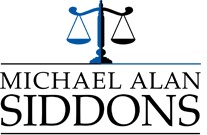Missing a few bills or credit card payments occasionally may not seem like it could seriously impact your financial state, but it can. One or two can easily escalate into five or six and could start to hinder your life as you work tirelessly to catch up. Unfortunately, most companies only care about getting their money, and failing to pay can cause them to shuffle your account over to a collections agency. The calls may seem never-ending and though you are working hard, you just cannot make enough to pay off what you owe. If you are facing this situation and are feeling as though you will never get out of debt, declaring bankruptcy may be an option for you.
Chapter 7 Bankruptcy vs. Chapter 13 Bankruptcy
There are two types of personal bankruptcy: Chapter 7 and Chapter 13, and they both have very different focuses. If you are not sure which one is right for your situation, call and speak to me, attorney Michael Alan Siddons. I am experienced in both types of bankruptcy and will be able to consult with you to determine which option is best for your situation.
Chapter 7 Bankruptcy
Chapter 7 bankruptcy is commonly referred to as a ‘fresh start’ because it eliminates your debts. Usually, this type is recommended when the person has a high amount of credit card debt as well as unsecured debt, which includes things like medical bills and payday loans. In this situation, a trustee is appointed and collects all your assets and sells those that are not listed as exemptions under the state’s law. The money from the sale is distributed between the creditors, minus a commission for the trustee. There are a few types of debts that cannot be satisfied in this manner, those of which include alimony, child support, and student loans.
Under this chapter, you can sign a “Reaffirmation Agreement” that allows you to keep certain secured debts, including your car, home, and furniture. This agreement reaffirms that you still owe that debt on those things and that you will continue to pay for that debt. However, to reaffirm those debts, it is required that the debt be current, meaning you cannot have months of overdue payments on those items.
Reaffirming the debt also means that you cannot claim bankruptcy on it for eight years, and if that’s the case, you want to make sure you stay on top of it because bankruptcy will not be an option until after the required period. If you find that you cannot stay on top of that debt, you have sixty days from when you filed the “Reaffirmation Agreement” to set it aside.
Chapter 13 Bankruptcy
Chapter 13 bankruptcy includes a repayment plan instead of eliminating your debts. This repayment plan is generally a proposed 3-5-year period in which you agree to pay all or part of your debts with your presumed future income. It is important to have an income before seeking this type of bankruptcy; failing to repay can cause even more problems. The determined amount to be repaid focuses on that income, but it also looks at how much the creditor would receive if you filed a Chapter 7 bankruptcy.
If your projected repayment over the 3-5 year time span is less than how much your assets would provide for an individual creditor, they may be more inclined to request Chapter 7 bankruptcy instead. This type of bankruptcy provides remedies for many different debt issues, including missed mortgage payments, back taxes, and even to prevent a house foreclosure. If you can follow through with the repayment plan, after 3-5 years, all remaining dischargeable debt will be released.
Work With Our Best Bankruptcy Attorney in Media, PA Today
While both Chapter 7 and Chapter 13 bankruptcies provide a solution to deal with your debt, they both approach such a resolution in different ways. If you are struggling with heavy debt and feel that you are just not able to keep up with your payments, contact me, Michael Alan Siddons today.
As an experienced bankruptcy attorney, I have the knowledge and comprehensive understanding to determine whether bankruptcy is right for you or if other options are available. Contact us today for a free consultation at (610) 255-7500.











